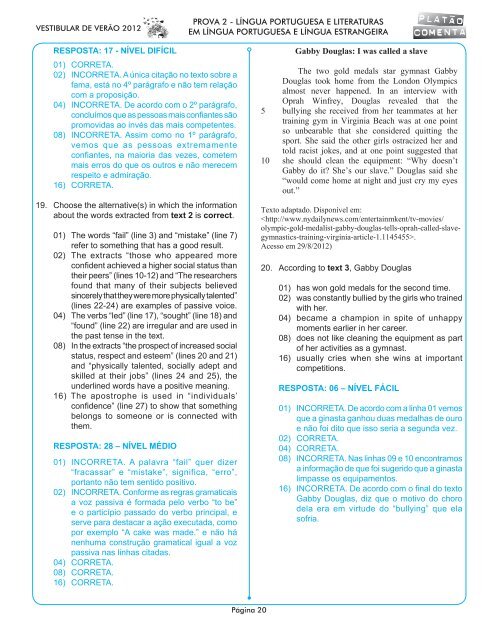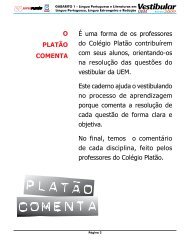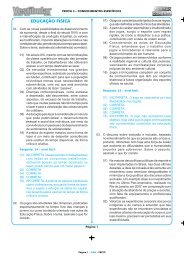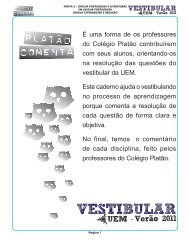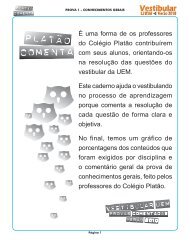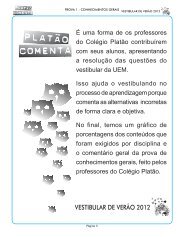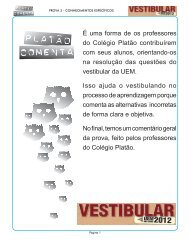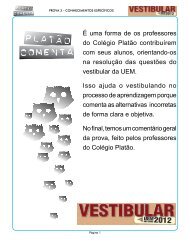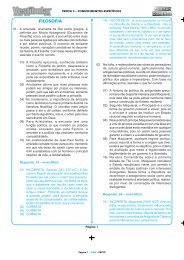Língua Portuguesa e Literaturas em Língua ... - Colégio Platão
Língua Portuguesa e Literaturas em Língua ... - Colégio Platão
Língua Portuguesa e Literaturas em Língua ... - Colégio Platão
You also want an ePaper? Increase the reach of your titles
YUMPU automatically turns print PDFs into web optimized ePapers that Google loves.
RESPOSTA: 17 - NÍVEL DIFÍCIL<br />
01) CORRETA.<br />
02) INCORRETA. A única citação no texto sobre a<br />
fama, está no 4º parágrafo e não t<strong>em</strong> relação<br />
com a proposição.<br />
04) INCORRETA. De acordo com o 2º parágrafo,<br />
concluímos que as pessoas mais confiantes são<br />
promovidas ao invés das mais competentes.<br />
08) INCORRETA. Assim como no 1º parágrafo,<br />
v<strong>em</strong>os que as pessoas extr<strong>em</strong>amente<br />
confiantes, na maioria das vezes, comet<strong>em</strong><br />
mais erros do que os outros e não merec<strong>em</strong><br />
respeito e admiração.<br />
16) CORRETA.<br />
19. Choose the alternative(s) in which the information<br />
about the words extracted from text 2 is correct.<br />
PROVA 2 - LÍNGUA PORTUGUESA E LITERATURAS<br />
EM LÍNGUA PORTUGUESA E LÍNGUA ESTRANGEIRA<br />
01) The words “fail” (line 3) and “mistake” (line 7)<br />
refer to something that has a good result.<br />
02) The extracts “those who appeared more<br />
confident achieved a higher social status than<br />
their peers” (lines 10-12) and “The researchers<br />
found that many of their subjects believed<br />
sincerely that they were more physically talented”<br />
(lines 22-24) are examples of passive voice.<br />
04) The verbs “led” (line 17), “sought” (line 18) and<br />
“found” (line 22) are irregular and are used in<br />
the past tense in the text.<br />
08) In the extracts “the prospect of increased social<br />
status, respect and este<strong>em</strong>” (lines 20 and 21)<br />
and “physically talented, socially adept and<br />
skilled at their jobs” (lines 24 and 25), the<br />
underlined words have a positive meaning.<br />
16) The apostrophe is used in “individuals’<br />
confidence” (line 27) to show that something<br />
belongs to someone or is connected with<br />
th<strong>em</strong>.<br />
RESPOSTA: 28 – NÍVEL MÉDIO<br />
01) INCORRETA. A palavra “fail” quer dizer<br />
“fracassar” e “mistake”, significa, “erro”,<br />
portanto não t<strong>em</strong> sentido positivo.<br />
02) INCORRETA. Conforme as regras gramaticais<br />
a voz passiva é formada pelo verbo “to be”<br />
e o particípio passado do verbo principal, e<br />
serve para destacar a ação executada, como<br />
por ex<strong>em</strong>plo “A cake was made.” e não há<br />
nenhuma construção gramatical igual a voz<br />
passiva nas linhas citadas.<br />
04) CORRETA.<br />
08) CORRETA.<br />
16) CORRETA.<br />
20. According to text 3, Gabby Douglas<br />
01) has won gold medals for the second time.<br />
02) was constantly bullied by the girls who trained<br />
with her.<br />
04) became a champion in spite of unhappy<br />
moments earlier in her career.<br />
08) does not like cleaning the equipment as part<br />
of her activities as a gymnast.<br />
16) usually cries when she wins at important<br />
competitions.<br />
RESPOSTA: 06 – NÍVEL FÁCIL<br />
01) INCORRETA. De acordo com a linha 01 v<strong>em</strong>os<br />
que a ginasta ganhou duas medalhas de ouro<br />
e não foi dito que isso seria a segunda vez.<br />
02) CORRETA.<br />
04) CORRETA.<br />
08) INCORRETA. Nas linhas 09 e 10 encontramos<br />
a informação de que foi sugerido que a ginasta<br />
limpasse os equipamentos.<br />
16) INCORRETA. De acordo com o final do texto<br />
Gabby Douglas, diz que o motivo do choro<br />
dela era <strong>em</strong> virtude do “bullying” que ela<br />
sofria.<br />
Página 20


